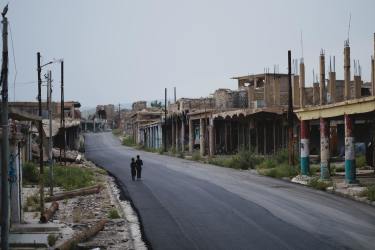
Syrian President Ahmad al-Sharaa has set out his views on ongoing discussions with Israel during an interview with The Washington Post, following his historic first visit to the White House on Monday.
Ahead of the visit, some reports suggested that a new security arrangement might be announced, though no formal statement has been made and negotiations are understood to be continuing.
In the interview, al-Sharaa was asked how he planned to defend Syria’s sovereignty in light of repeated Israeli military strikes in the years since the collapse of the Assad regime. Israel previously destroyed much of Syria’s heavy weaponry and later targeted sites linked to forces aligned with the new authorities after incidents affecting the Druze community in the south.
Al-Sharaa pointed to the 1974 Disengagement Agreement, reached after the Yom Kippur War, saying it had remained in place for 50 years and alleging that Israel had been the party to breach it. Israeli officials, however, argue that the agreement ceased to apply when the Syrian army disintegrated, allowing armed Islamist groups to move near the border.
The Syrian leader claimed that Israel had “expanded their presence” inside Syria, forced out UN peacekeepers, and carried out more than 1,000 airstrikes since December 8, including strikes near government facilities. He said his government had not responded militarily because it was focused on rebuilding the country, accusing Israel of acting out of “expansionist ambitions” rather than security concerns.
Al-Sharaa said that direct talks with Israel were under way and had moved “a good distance,” but insisted that any final agreement would require Israel to pull back to its pre-December 8 positions. He added that the United States was involved in the discussions and said former President Trump supported what he described as Syria’s position.
Asked about reports that Israeli Prime Minister Benjamin Netanyahu wants the area south of Damascus, closest to the Israeli border, to be demilitarised, al-Sharaa said such a move would be “difficult,” arguing that Syria must retain control of its own territory. He warned that a demilitarised zone could become vulnerable to armed groups, raising questions about responsibility for cross-border attacks.
On Tuesday, Syria’s information minister confirmed that al-Sharaa had signed a cooperation document with the US-led coalition fighting Islamic State (ISIS), seen as one of the key objectives of his visit alongside efforts to secure sanctions relief.
According to Syrian officials and Western diplomats cited by The New York Times, al-Sharaa had previously taken part in operations against ISIS before the fall of the Assad regime, having led a rebel coalition that broke away from extremist factions several years earlier. Personal sanctions against him were lifted shortly before his visit to the United States.
Reuters has reported that ISIS militants attempted to assassinate al-Sharaa in two separate plots in recent months. Syrian state media also announced that security forces arrested more than 70 suspected militants over the weekend during a nationwide operation targeting ISIS cells.
Adapted from All Israel News.




